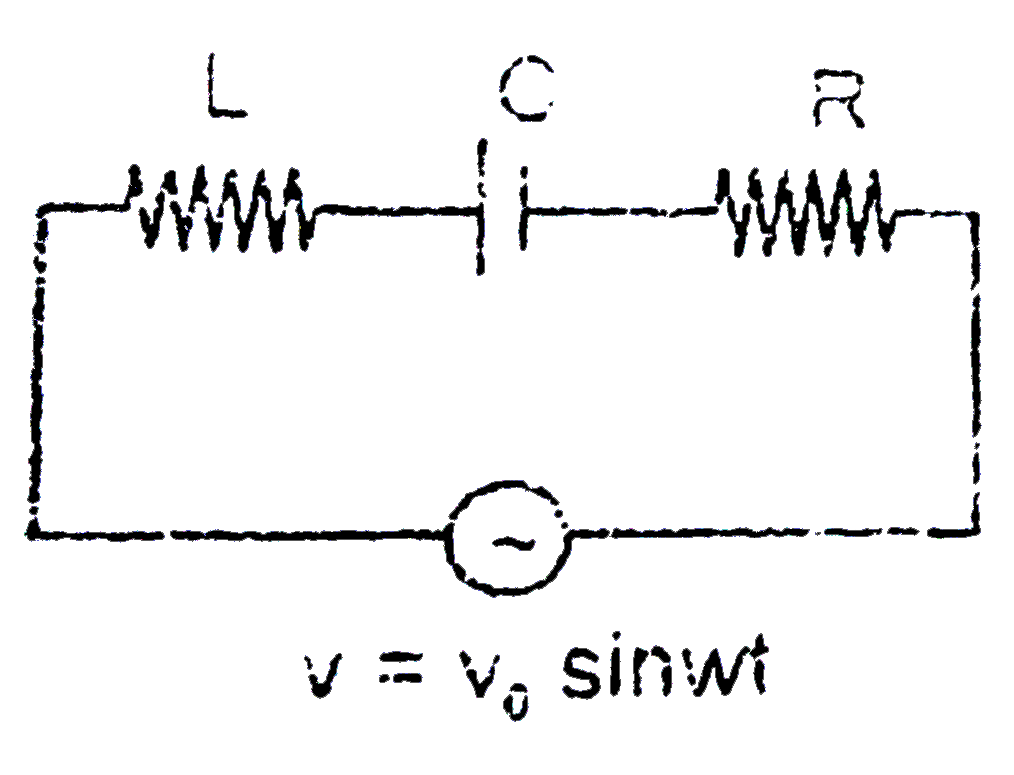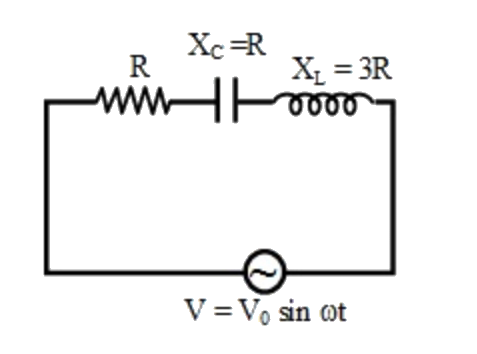A voltage V=V0sinωt is applied to a series LCR circuit. Derive expression for the average power dissipated over a cycle.
Under What condition (i) no power is dissipated even though the current flows through the circuit?
(ii) Maximum power is dissipated in the circuit?
Video Solution
Text Solution
Current in this circuit will be I=I0sin(wt+ϕ)
where
ϕ=tan−1(xL−xCxR)
xL=wL,x=1WC,xR=R
P∈st=V.I
=(v0sinwt)[l0sin(wt+ϕ)]
=v0I0(sinwt)[sin(wt+ϕ)]
=v0I022sinwt[sin(wt+ϕ)]
v0I02[cos−(wt−(wt+ϕ)−cos(2wt+ϕ)]
Pavg=ITT∫0P∈stdt
=ITT∫0v0I02[(cosϕ)−cos(2wt+ϕ)]dt
T=2πω,wt=θ
wdt=dthη
12π2π∫0v0I02[(cosϕ)−cos(2wt+ϕ)]dθ
⇒v0I02cosϕ−O
v0I02cosϕ⇒vrms−Irmscosϕ
(i)no power is dissipated if ϕ=π2 i.e. R=0.
(ii)Maximum power is dissipated if ϕ=0 i.e. w2=1LC

|
Topper's Solved these Questions
- ALTERNATING CURRENTBOOK - RESONANCECHAPTER - ALTERNATING CURRENTEXERCISE - A.L.P
10 Videos
- ALTERNATING CURRENTBOOK - RESONANCECHAPTER - ALTERNATING CURRENTEXERCISE - SOLVED MISCELLANEOUS
14 Videos
- ALTERNATING CURRENTBOOK - RESONANCECHAPTER - ALTERNATING CURRENTEXERCISE - Exercise -3 Part-2
3 Videos
- ATOMIC PHYSICSBOOK - RESONANCECHAPTER - ATOMIC PHYSICSEXERCISE - Advanved level problems
17 Videos
Similar Questions
A voltage V=Vmsinωt is applied to a series L-C-R circuit. Derive the expression for the average power dissipated over a cycle. Under what condition (i) no power is dissipated even though the current flows through the circuit, (ii) maximum power is dissipated in the circuit ?
View SolutionThe power dissipated in the following circuit is
View Solution
Knowledge Check
When a voltage V=V0 cos ωt is applied across a resistor of resistance R, the average power dissipated per cycle in the resistor is given by
AV0√2RBV0√2ωRCV202RDV202ωRIn the series LCR circuit, the power dissipation is through
ARBLCCDBoth L and CThe average power dissipated in an AC circuit containing a resistance along is
AermsIrmsBermsIrmscosϕC0Dnone of these
The power dissipated in the adjacent circuit is -

View SolutionDerive the expression for the power dissipated by an ideal resistor in an AC circuit .
View SolutionThe average power in LCR series circuit is
View SolutionThe average power dissipation in a pure capacitance in AC circuit is
View SolutionIf the current through a resistor in a circuit increases by 3%, the power dissipated by the resistor
View Solution
